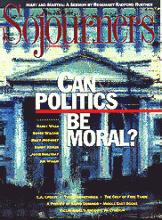The war in the Persian Gulf presented extraordinary dangers to the entire world community. More than a year after the "victory" celebrations and parades throughout the United States, it is increasingly clear that most of the central political and economic issues fueling the confrontation were not resolved by the massive military assault on Iraq.
The intense media focus during the crisis provided an opportunity to see several systemic problems more clearly. People of faith living comfortably in the West were then and are now challenged to wrestle with our own complicity in the politics of oil, the escalating arms race, and ongoing human rights abuses. The issues are many and sometimes converge in volatile ways.
The Gulf crisis illustrated vividly the interconnected nature of regional and global politics. This "linkage" was readily apparent in relation to the Israeli-Palestinian-Arab conflict. During and after the war, various political and religious leaders underscored the necessity for measurable progress in resolving this central and most destabilizing issue in the Middle East.
With encouragement from the international community, the Bush administration has actively facilitated a new peace process. Nine trips to the Middle East and persistent diplomacy by then-Secretary of State James Baker III during 1991 and 1992 have borne fruit. Negotiations between Arabs and Israelis are now under way.
Read the Full Article

